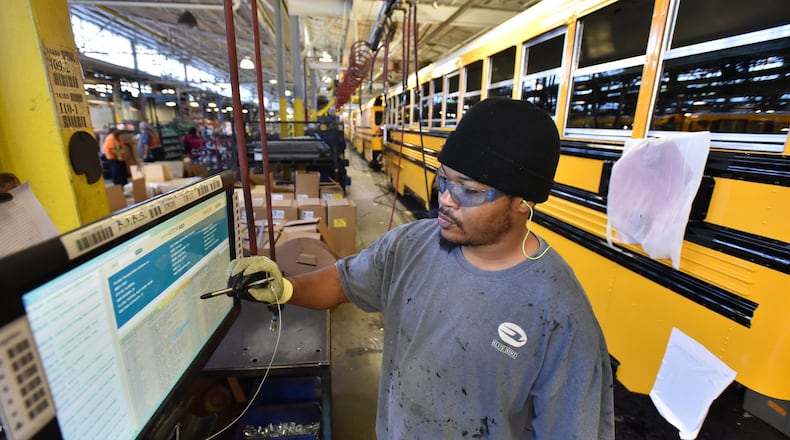Tariffs on steel and aluminum would have mixed effects in Georgia, but most of the impact would be negative, according to a survey of business and economic experts.
If President Trump follows through on Thursday’s announcement that he will slap a 25 percent tax on foreign-made steel and 10 percent on aluminum, the likely outcome will be higher costs for companies and — eventually — consumers, too.
Following up on a campaign promise, Trump said the tariffs would bolster American-made steel and aluminum sectors. He — like some on the political left — argues that some countries are competing unfairly and tariffs would level the playing field.
VIDEO: In other Business news
But there are many more companies and workers – in Georgia and nationally – that will see their materials cost rise, said Jeffrey Humphreys, director of the Selig Center for Economic Growth at the University of Georgia.
"Construction, the auto industry, machinery-manufacturers, making appliances, washing machines, air conditioners and some defense manufacturers," he said. "So the positives would be outweighed by the negative effects on industries that use steel and aluminum, as well as consumers."
Even more troubling is the chance of retaliation by other countries, Humphreys said. "Retaliation, that is the biggest fear. A trade war would be pretty devastating for Georgia."
Most vulnerable would be Georgia agriculture, since it's a major part of the state's economy. But China and others could look for alternative sources of the products, he said.
But right away, manufacturers could see higher costs, said Roy Bowen, president of the Georgia Association of Manufacturers, who said members had been calling to voice their worries.
The state has a few companies that make steel: Brazil-based Gerdau and Belgium-based Bekaert. Attempts to reach those companies Friday were not successful.
But the vast majority of manufacturers buy the materials, Bowen said. “That might affect the exports of companies like John Deere or Caterpillar. Yes, Georgia manufacturers are concerned.”
Georgia manufacturing accounts for about $56 billion in production and 385,700 employees, according to the Center for Manufacturing Research.
Many of them make products made partly from steel or aluminum: Lockheed and Gulfstream build jets. Kia assembles cars. Caterpillar makes tractors. Blue Bird churns out buses.
Pretty much anyone who follows the industry knew tariffs would be an issue.
For example, industry analysts started calling at 7 a.m. Friday to ask how much the tariffs would affect the company, said Mark Benfield, spokesman for Fort Valley-based Blue Bird Corp, which has 2,400 employees and sales of nearly $1 billion.
“We are still working through how this will affect us,” he said.
The state also has an $11.8 billion-a-year food and beverage sector, including many that use aluminum to can beer, soda and other drinks.
That includes Coca-Cola, MillerCoors and a host of local breweries, said Duane Stanford, executive editor of the trade publication Beverage Digest.
The beer industry in particular is moving to cans, he said, and Trump’s announcement “creates a lot of confusion in the market.”
Credit: HYOSUB SHIN / AJC
Credit: HYOSUB SHIN / AJC
Companies like Coke probably won’t change production models because of the tariff. Big companies also have a number of levers they can pull to provide a buffer from the new costs.
“You either absorb it, or raise your prices or you find other cuts elsewhere,” Stanford said.
MillerCoors, which makes Coors Lite and Miller Lite but also has stakes in craft breweries like Athens’ Terrapin Beer Co., said it was “disappointed” in Trump’s announcement.
“We buy as much domestic can sheet aluminum as is available, however, there simply isn’t enough supply to satisfy the demands of American beverage makers like us,” MillerCoors said on Twitter. “American workers and American consumers will suffer as a result of this misguided tariff.”
For smaller companies, especially independent microbreweries, adapting will be hard, Stanford said. “Some are moving totally into cans, they’re not even in bottles anymore.”
In Atlanta, where construction cranes dot the skyline, the cost of building has been on the rise already and tariffs would add to the tab, said Dan Kaufman, president for the east region for construction giant J.E. Dunn.
Construction companies have been struggling to find skilled labor, such as plumbers and electrical workers, often paying more to get the help they need, he said: costs of building have been rising 3 to 4 percent per year.
“In construction, a 25 percent price increase in steel and 10 percent in aluminum cascades to so many components,” he said.
Kaufman said the tariffs would touch nearly everything he sees.
Not just steel joists in a skyscraper, there would be price hikes for window frames and the guts of heating and air conditioning systems. There’s also steel rebar in concrete and aluminum in office furniture.
And everyone in the supply chain will be forced to pass along those costs, Kaufman said. “It all rolls down to the consumer eventually.”
There's little denying that there are problems in current trade rules, said Bowen, at the manufacturers association: some countries subsidize some sectors, allowing companies to sell at unfairly low prices.
Trade deals can be renegotiated or restructured. But tariffs are an attack on all producers, he said. "It is safe to say that we do not favor a shotgun approach. We think that this broad-based approach is ill advised."
Bowen said he hopes that the criticism of many companies – and the way the news sent the stock market tumbling – will eventually convince the president to retreat on tariffs. “I am hoping that cooler heads and sharper intellects will prevail.”
MYAJC.COM: REAL JOURNALISM. REAL LOCAL IMPACT.
AJC Business reporter Michael E. Kanell keeps you updated on the latest news about jobs, housing and consumer issues in metro Atlanta and beyond. You'll find more on myAJC.com, including these stories:
Never miss a minute of what's happening in local business news. Subscribe to myAJC.com.
Keep Reading
The Latest
Featured






